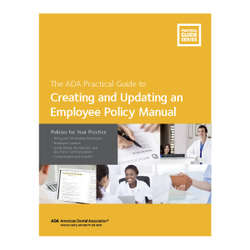Читать книгу Creating and Updating an Employee Policy Manual: Policies for Your Practice - American Dental Association - Страница 27
На сайте Литреса книга снята с продажи.
Red Flags in the Interview Process
ОглавлениеNothing will give you a more accurate picture of someone’s job potential than an interview. Interviews give you a chance to see how candidates interact with you and your staff, and allow them to personally express how they would contribute to the practice. However, the interview can also raise some red flags that show a candidate may not be a good fit.
The following list of common red flags has been adapted from John Putzier and David Baker’s The Everything HR Kit: A Complete Guide to Attracting, Retaining, and Motivating High-Performance Employees. It offers some signs to watch for when conducting an interview:
• Arriving late to the interview. Natural disasters aside, there are very few reasons to justify being late to an interview. Is this the behavior you can expect if the candidate is hired?
• Treating staff without respect. This not only reflects how the candidate treats his or her potential colleagues, but could be a good indication of how he or she will treat your patients. It also indicates a lack of forethought since staff may have some influence in the hiring of new employees.
• Cannot substantiate the accomplishments on their resume or cover letter. If the candidate is unable to elaborate on skills or past projects, you should question whether they are being truthful.
• Dressing inappropriately for the interview. This shows poor planning and decision making, two qualities that are especially undesirable in a clinical setting.
• Criticizes past employers and coworkers. This may indicate the candidate lacks discretion or has problems with authority, two particularly important concerns when working in a healthcare setting.
• Lack of preparation. Candidates who are organized with a pen and paper and extra resumes show they will most likely approach their jobs in the same way. You should also be wary of candidates who do not ask questions since this may indicate they either lack enthusiasm for the job opportunity or have not done their research on the practice or the industry.
• Being too casual. Even if your practice has a laidback culture, interviews are still a formal process and an opportunity to impress a potential boss. If a candidate uses overly casual speech and body language with you, someone he or she is trying to impress, who is to say he or she won’t interact with patients in a similar manner?
• Being more focused on the benefits than the job. Good benefits attract and keep quality candidates. But in the interview phase, benefits should be secondary to learning about what the job entails and whether it is a good fit for the candidate.
• Not taking responsibility for past failures and pinning the blame on others. Ideally, you would like employees who own up to their mistakes, learn from them, and move on.
